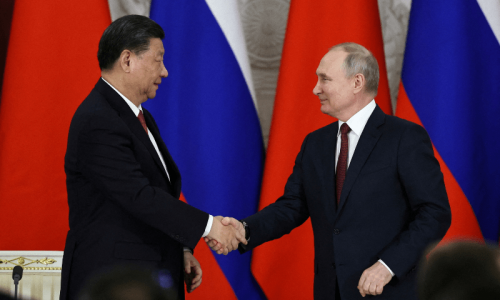WASHINGTON: Military investigations into alleged US atrocities in Iraq, including the killings of 24 civilians at Haditha, shine the spotlight anew on a question raised by the abuses of Iraqi prisoners at Abu Ghraib: how far up the chain of command should officials be held accountable, if the misconduct is confirmed?
At this stage, with the investigations not yet complete, it appears that a small number of Marines could face murder charges in connection with the killings at Haditha on November 19. Several other Marines are expected to be charged soon in relation to the alleged April 26 murder of an Iraqi civilian in Hamdania that investigators believe was planned in advance.
But the accountability question broadened when the military discovered that some officers in the Marine chain of command may have covered up the true circumstances of the Haditha incident or were derelict in their duty to report what they knew. Aside from the legal liability of those directly involved in killings, more senior officers could be relieved of duty or face other administrative discipline if they are faulted for leadership failures.
In Abu Ghraib, the highest-ranking officer to face criminal charges was a lieutenant-colonel, and the most senior officer to receive administrative punishment was a one-star Army Reserve general who was demoted to colonel. Criminal penalties against the 10 lower-ranking soldiers to be convicted have ranged from no prison time to 10 years.
John Sifton, a terrorism researcher for Human Rights Watch, the New York-based advocacy group, said it is too early to know how high the Haditha blame will spread, but he worries that lower-ranking Marines will take the brunt of it. “The criminal investigative capacity of the US military is so stacked in favour of commanders” and against the enlisted troops, he said.
There is no indication so far that anyone at the Pentagon had a hand in covering up or suppressing information on Haditha.
Still, at a time of sagging US public support for the war and the approach of the 2008 presidential campaign, the accountability question is likely to grow in prominence when more is known about what happened at Haditha. Already some on Capitol Hill and elsewhere are pointing the finger at Defense Secretary Donald H. Rumsfeld, who twice offered his resignation to President George W. Bush in the aftermath of Abu Ghraib.
John Batiste, a recently retired army major-general who commanded combat forces in Iraq, said last weekend he saw a ‘direct link’ between Haditha and Rumsfeld’s management of the war. Batiste has repeatedly called for Rumsfeld to quit.
Asked about calls for Rumsfeld’s resignation, Pentagon spokesman Bryan Whitman said, “It would be unfortunate if politics entered into this discussion. And that’s all I have to say on it.”
Janis Karpinski, who was demoted from brigadier-general to colonel for her role in Abu Ghraib, said that at the very least Rumsfeld and other senior officials can be faulted for failing to learn from the prisoner abuse scandal that US troops are under excessive strain and stress, with inadequate guidance from their leaders.
“Were they oblivious to the exhaustion level of military people?” Karpinski said in a telephone interview.
“I am really afraid for the people who are going to get caught in the shadow of these investigations because once again they will be thrown to the wolves, and the people who did know and who covered it up will be scurrying away to safe corners and safe harbours and will be protected by people who have a vested interest in protecting them,” she added.
The most senior Marine in Iraq at the time was Maj.-Gen. Stephen Johnson. He is now at Quantico, Virginia, directing a high-level study on the future shape of the Marine Corps. The Washington Post has reported that plans to promote Johnson to the rank of lieutenant-general have been put on hold because of Haditha.
Marine spokesman Lt.-Col. Scott Fazekas said he had no information about Johnson’s promotion prospects.
One of the enduring arguments over Abu Ghraib is whether senior officers and even Rumsfeld should have been punished.
One major difference between the cases at Abu Ghraib and Haditha is that the prisoner abuses were, in part, linked to the debate over acceptable interrogation policies. That had a Rumsfeld link. The Haditha episode does not.—AP











































Dear visitor, the comments section is undergoing an overhaul and will return soon.